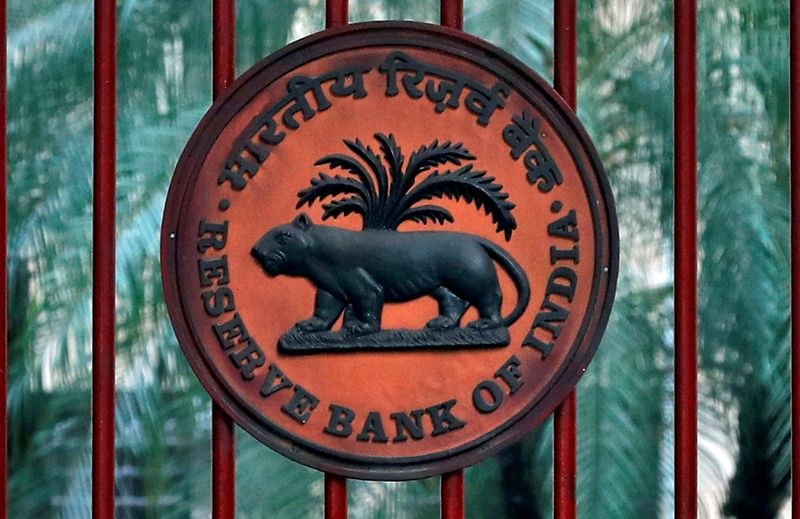RBI seen raising rates by smaller 35bps in Dec, hiking again in early 2023: Reuters poll
2022.12.01 01:36
[ad_1]

© Reuters. FILE PHOTO: A Reserve Bank of India (RBI) logo is seen at the gate of its office in New Delhi, India, November 9, 2018. REUTERS/Altaf Hussain
By Shaloo Shrivastava
BENGALURU (Reuters) – The Reserve Bank of India will raise interest rates by a smaller 35 basis points to 6.25% in December, according to economists polled by Reuters who expect another modest move up early next year to curb lingering inflation pressures.
A strong two-thirds majority said it was still too soon for the central bank to take its eye off inflation, which slowed to 6.77% in October having stayed above the upper end of the RBI’s 2-6% tolerance band all year.
The expectations for a more modest rate rise follow a series of 50 basis point hikes by the RBI, and coincides with expectations that the U.S. Federal Reserve will shift to smaller rate rises at its policy meeting this month.
Thirty-three, or more than 60%, of the 52 economists polled between Nov. 22-30 said the RBI would raise its key repo rate by 35 basis points to 6.25% at its Dec. 5-7 policy meeting.
Eleven said it would continue hiking by 50 basis points, while another eight respondents said 25 bps.
“A 50 bps hike would be too aggressive given that inflation has started showing signs of moderation and is progressing in line with the RBI’s projections,” said Sakshi Gupta, principal India economist at HDFC.
“The terminal rate in this cycle is expected to be 6.50% and the path to this is likely to be split between two rate hikes — 35 bps in December and then 25 bps in February.”
With inflation expected to remain above the 4.00% midpoint of the RBI’s target for the next two years, rates are set to go a bit higher still, with most economists seeing an upside risk to their forecasts.
The RBI also has to consider the potential pressure on the rupee if it falls behind expected increases in U.S. rates.
“The risk that the Fed tightens even more than current pricing of close to 5% is reasonably high and that could keep pressure on emerging market central banks such as the RBI to abstain from signalling the end of rate hikes,” said Abhishek Upadhyay, senior economist at ICICI Securities Primary Dealership.
Despite poll medians showing the repo rate topping out at 6.50% by end-March, there was no consensus among economists over the RBI’s final rate move in this cycle.
Economists were evenly split between no increase and a hike of 25 bps at the February meeting, with 44 of 52 expecting those outcomes. Among the rest, five predicted a 35 bps hike, and there were lone forecasts for 10 bps, 15 bps and 40 bps.
The survey also showed expectations that inflation would average 6.7% for the fiscal year ending March 31, and then fall to 5.2% in fiscal 2023-24.
Radhika Rao, senior economist at DBS Bank, said a sharp run-up in commodity prices, supply-side shocks, resilience in domestic demand engines and a prolonged global tightening cycle that would put pressure on the rupee were risks “that might convince the RBI to consider extending its rate hike cycle.”
Gross domestic product (GDP) growth for July-September was reported at 6.3%, matching the RBI’s own forecasts.
More than 70% of economists, 20 of 28, who answered an additional question in the poll, taken before the GDP release, said it was still too early for the RBI to shift its focus from inflation to growth.
Economists who answered a separate question pegged India’s potential economic growth rate for the next 2-3 years at 6%-7%. They forecast the annual growth rate to average 6.8% and 6.2% this fiscal year and next, respectively.
[ad_2]
Source link







